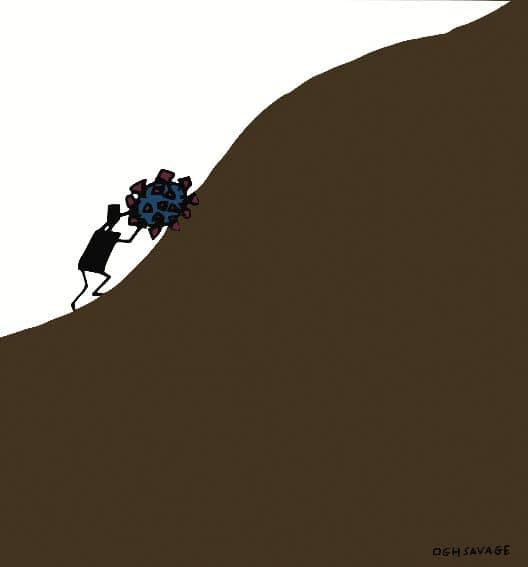
Many popular reading lists for the COVID-19 pandemic include The Plague, a 1947 novel by Albert Camus. The author was an existentialist philosopher who was also a journalist, a writer, and a member of the French Resistance to the Nazi occupation. Camus was born in Algeria, and his father died soon after his birth. For a fascinating glimpse into Camus’ life, have a look at Albert Camus: A Biography, by Herbert R. Lottman.
Though he disavowed being called an existentialist as a means to avoid association with Jean-Paul Sartre, a one-time friend turned enemy, Camus’ work nevertheless centers upon existentialist themes, such as each person’s need to take responsibility for their own choices and actions and in doing so to create meaning for their lives. For the existentialists there is no yardstick by which to measure meaning; rather human beings ascribe meaning to life themselves. Camus’ unique twist on this involves couching it within ‘the absurd’. For Camus, we must take responsibility for creating meaning for ourselves just because of the fundamental absurdity of life – the mismatch between what we would want from life and what it actually gives us. And perhaps the most absurd part of the entire affair is that we never find out if we did it right or not. In The Plague living virtuously is presented as one way of creating meaning. But for Camus, even virtue is not meaningful beyond what it means to the one who has it.
This story is from the June/July 2020 edition of Philosophy Now.
Start your 7-day Magzter GOLD free trial to access thousands of curated premium stories, and 8,500+ magazines and newspapers.
Already a subscriber ? Sign In
This story is from the June/July 2020 edition of Philosophy Now.
Start your 7-day Magzter GOLD free trial to access thousands of curated premium stories, and 8,500+ magazines and newspapers.
Already a subscriber? Sign In

"Stand Out Of My Light"
Sophie Dibben watches Alexander the Great meet Diogenes the Cynic.

Thomas Hobbes (1588-1679)
Hilarius Bogbinder looks at a man who wanted to make Peace from Warre.

The Philosophy of Work
Alessandro Colarossi has insights for the bored and understimulated.

Towards Love
George Mason on love as shared identity.

Hume's Problem of Induction
Patrick Brissey exposes a major unprovable assumption at the core of science.

A Philosophical History of Transhumanism
John Kennedy Philip goes deep into the search for (post-) human heights.

How to Have a Good Life
Meena Danishmal asks if Seneca's account of the good life is really practical.

Horseplay in Hibernia
Seán Moran explores equine escapades in Eire and elsewhere.

Philosophy & Hurling: Thinking & Playing
Stiofán Ó Murchadha knowing how we know.

Philip Pettit & The Birth of Ethics
Peter Stone thinks about a thought experiment about how ethics evolved.